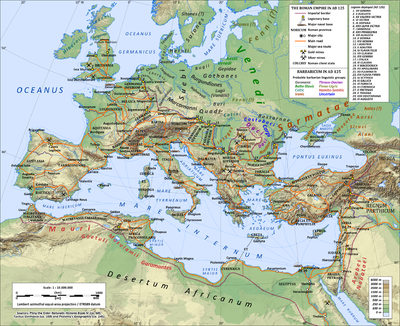- Marcomanni
-
The Marcomanni were a Germanic tribe, probably related to the Buri, Suebi or Suevi.
Contents
History
Origin
Scholars believe their name derives possibly from Proto-Germanic forms of "march" ("frontier, border") and "men".
The Marcomanni settled in the Main River valley soon after 100 BC. To escape Roman aggression in 9 BC they migrated east to Bohemia, where their king Maroboduus established a powerful kingdom that Augustus perceived as a threat to Rome. Before he could act, however, the war in Illyria intervened. Eventually Maroboduus was deposed and exiled by Catualda (AD 19).
Tacitus, in the late 1st century mentions (Germania I.42) the Marcommani as being under kings appointed by Rome. [1]
Marcomannic Wars
In the 2nd century AD, the Marcomanni entered into a confederation with other peoples including the Quadi, Vandals, and Sarmatians, against the Roman Empire. This was probably driven by movements of larger tribes, like the Goths. According to the historian Eutropius, the forces of the Emperor Marcus Aurelius battled against the Marcomannic confederation for three years at the fortress of Carnuntum in Pannonia. Eutropius compared the war, and Marcus Aurelius' success against the Marcomanni and their allies, to the Punic Wars. The comparison was apt in that this war marked a turning point and had significant Roman defeats; it caused the death of two Praetorian Guard commanders. The war began in 166, when the Marcomanni overwhelmed the defences between Vindobona and Carnuntum, penetrated along the border between the provinces of Pannonia and Noricum, laid waste to Flavia Solva, and could be stopped only shortly before reaching Aquileia on the Adriatic sea. The war lasted until Marcus Aurelius' death in 180. It would prove to be only a limited success for Rome; the Danube river remained as the frontier of the Empire until the final fall of the West.
Later history
The Christianisation of the Marcomanni occurred under their queen Fritigil (mid fourth century), who corresponded with Ambrose of Milan to bring about the conversion.
There is a runic alphabet called the Marcomannic runes, but they are not believed to be related to the Marcomannic people.
After crossing the Pyrenees in 409, a group of Marcomanni, Quadi and Buri, established themselves in the Roman province of Gallaecia (modern Galicia and northern Portugal), where they were considered foederati and founded the Suebi Kingdom of Gallaecia. There, Hermeric swore fealty to the Emperor in 410. Bracara Augusta, the modern city of Braga in Portugal, previously the capital of Roman Gallaecia, now became the capital of the Suebic kingdom.
Kings of the Marcomanni
- Maroboduus, c. 9 BC - 37 CE
- Ballomar, c. 166 CE ? - 172 or 178 CE ?
See also
- List of Germanic peoples
- Migrations period
- Timeline of Germanic kingdoms
- History of Portugal
- Gallaecia
- Galicia (Spain)
- History of Spain
- Irminones
Germanic peoples Languages Prehistory Roman Iron Age Magna Germania · Wars with Rome · Battle of the Teutoburg Forest · Germania · Irminones · Ingaevones · Istvaeones · Chatti · Marcomanni · SuebiMigration Period Germanic Iron Age · Alamanni · Anglo-Saxons (Angles · Jutes · Saxons) · Burgundians · Dani · Franks · Frisii · Geats · Goths (Visigoths · Ostrogoths · Valagoths · Gothic Wars) · Gotlanders · Lombards · Suebi · Suiones · Vandals · Varangians · Christianization of the Germanic peoples · RomanizationSociety and culture Mead hall · Poetry · Migration Period art · Runes (Runic calendar) · Sippe · Law (Lawspeaker · Thing) · Calendar · King · Names · Numbers · Romano-Germanic cultureReligion Wodanaz · Veleda · Tuisto · Mannus · Paganism (Anglo-Saxon · Continental Germanic mythology · Frankish · Norse) · Christianity (Arianism · Gothic)Dress Warfare Burial practices List of Germanic peoples · Portal:Ancient Germanic culture Classical Sources
Categories:- Ancient peoples
- Ancient Germanic peoples
- Germanic peoples
- Ethnic groups in Europe
- History of the Germanic peoples
- Iron Age Europe
Wikimedia Foundation. 2010.

